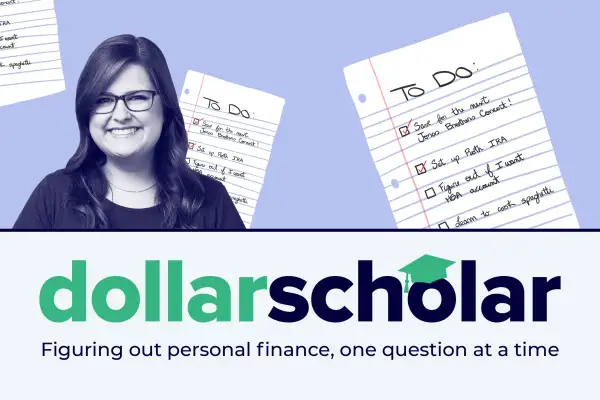Dollar Scholar Asks: What Money Moves Should I Make in My 30s?

This is an excerpt from Dollar Scholar, the Money newsletter where news editor Julia Glum teaches you the modern money lessons you NEED to know. Don't miss the next issue! Sign up at money.com/subscribe and join our community of 160,000+ Scholars.
As I write this, I am eating a bowl of spaghetti that took me over an hour to make because I ignored the instructions in the recipe, burned the meatballs and set off all the fire alarms in my house — twice. Then I discovered I can’t reach the button to turn off the alarms EVEN WHEN I’M STANDING ON A CHAIR.
Sometimes I feel like I’m killing it, and sometimes I feel like I’m in no place to be giving anyone advice at all. Clearly, I’ve got a lot to improve upon.
I've previously picked experts’ brains about what I should have accomplished financially by the time I turn 30. (Short answer: Set up a budget, get my debt under control and start an emergency fund.) Now, I’m pivoting to the future.
One goal I have for this next decade of my life is to learn how to cook spaghetti without setting the house on fire. Another is to get taller. But what about my finances?
What money tasks should I tackle — and hopefully achieve — in my 30s?
Brent Weiss, a certified financial planner (CFP) and co-founder of Facet Wealth, told me the best thing he did when he was my age was to get serious about setting goals.
“Who do you want to be? What do you want to leave behind? Where do you want to be in three or five years?” he says.
Only then, he says, can I start to figure out the steps I'll need to take to get the life I want — not the one social media or my family or even Money tells me I quote-unquote should want.
“Understanding what the right track is for you is arguably the most important thing you can do," Weiss says. "If you're not putting money towards the things that give you excitement, joy or fulfillment, a) you're never going to stick to it and b) you're not going to enjoy the process.”
From there, the focus should be on evaluating whether I’m headed in the right direction for me, regardless of other people’s paths or expectations. Are my money habits moving me toward my destination?
Speaking of destinations, Mark Reyes, a CFP with Albert, says my 30s are an ideal time to start saving for retirement in earnest.
He suggests a three-pronged approach. First, I should set up a 401(k) through my employer and take advantage if they match employee contributions. Otherwise, I’m leaving free money on the table.
I can also look into setting up a Roth IRA, or individual retirement account, where my contributions are taxed based on what I earn today. Because I’ll likely earn more money later in life, it’s important to save what I can in that account now before I enter a higher tax bracket.
Third, I may want to fund a health savings account, or HSA, and try not to spend the money while I’m young and healthy. HSAs offer what experts like to call a triple tax benefit: My contributions are pre-tax, the money grows tax-free and withdrawals for certain medical expenses are tax-free.
The sooner I have these accounts set up, the sooner I can start taking advantage of the magic of compounding. Weiss says that’s the “beautiful thing about [being] about to turn 30”: Time is on my side.
There’s an oft-repeated rule of thumb in finance that I should have the equivalent of my annual salary saved by the time I turn 30, three times my salary by 40, five times my salary by 50 and eight times my salary by 60.
These are not hard-and-fast rules everyone has to follow. But in general, Reyes says, “it’s a good, healthy habit to set aside funds earlier rather than later.”
The final thing I might want to do in my 30s is consider talking to a financial advisor.
Admittedly, he’s biased, but Weiss says to view this as another investment in my future. Although I may understand the basics of budgeting or saving, linking up with a financial planner can help me zoom out and look at my money situation holistically — view “all the pieces [in] the puzzle,” Weiss says.
I know from my previous reporting that what I want is a fee-only CFP or CFA (chartered financial analyst). Qualifications and affordability are key here — while some advisors work on retainer or have asset minimums, others offer subscription services. The CFP Board and the National Association of Personal Financial Advisors both have tools on their websites that’ll let me browse through my options.
The bottom line
My 30s are an excellent time to get serious about setting goals, put away money for retirement and chat with a financial advisor. However, I should avoid worrying about whether I’m on the “right track” because it varies so much for each person.
There’s no need to freak out.
“You have time. But you have to create a plan and take action to get to where you want to be," Weiss says.
More from Money:
How Much Should You Have Saved by 30? Here's Some Surprisingly Reassuring Expert Advice
5 Tricks to Get More From Your Paycheck This Year
This Is How Much Money You Should Have in Stocks — at Every Age
